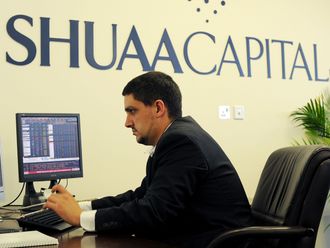Abu Dhabi: The region stock markets are likely to come under increased selling pressure in the week ahead due to mounting unrest in Libya and Bahrain, but markets in the UAE and Qatar offer some attractive buying opportunities which, potentially, can limit the slide if investors take longer-term bets, market analysts say.
The civil war in Libya took a significant turn yesterday when a fighter jet fell from the sky and burst into flames as explosions rang out in the rebel stronghold of Benghazi. A day earlier, the government said it was abiding by a ceasefire and no-fly zone, but violence from forces loyal to Libyan leader Muammar Gaddafi have continued.
"Political risk may remain an overhang in the region. We therefore strongly prefer the relative stability of Qatar and the UAE, which enjoy strong oil prices that support overall balances and with them government commitments to invest in the diversification of their economies," said Jaap Meijer, Head of the bank team at Alembic HC.
"The developed equity markets look tired with the US equity market showing a quadruple top and now drifting lower. We would not be surprised to see a 10 per cent correction. Momentum has weakened as the rapid increase in oil prices and now the Japanese earthquake have added to the downside risks to global growth," said Gary Dugan, Chief Investment Officer - Private Banking at Emirates NBD.
"We see great opportunities in Mena bond markets as on spread terms we have seen GCC credit widening despite the ten-year Treasury yields moving lower by 33 bps from its peak of 3.73 per cent. Once things stabilise politically in the GCC, we are due to see a good rally in the Mena credit space," he added.
A massive earthquake in Japan, on March 11, followed by a tsunami and nuclear crisis spooked investor confidence across global financial markets last week.
The US stocks fell, sending the Standard & Poor's 500 Index to the biggest drop since August, amid concern that Japan's nuclear crisis and violence in Libya and Bahrain may curb the global economy.
The S&P 500 retreated 1.9 per cent to 1,279.20 and the Dow dropped 185.88 points, or 1.5 per cent, to 11,858.52.
European stocks tumbled the most in eight months after the earthquake damaged cooling systems at an atomic power plant, causing the worst nuclear accident since Chernobyl.
Asian stocks fell as well, led by the biggest drop in the Nikkei 225 Stock Average in two years, after Japan's earthquake and a nuclear crisis sparked concern about global economic recovery.












